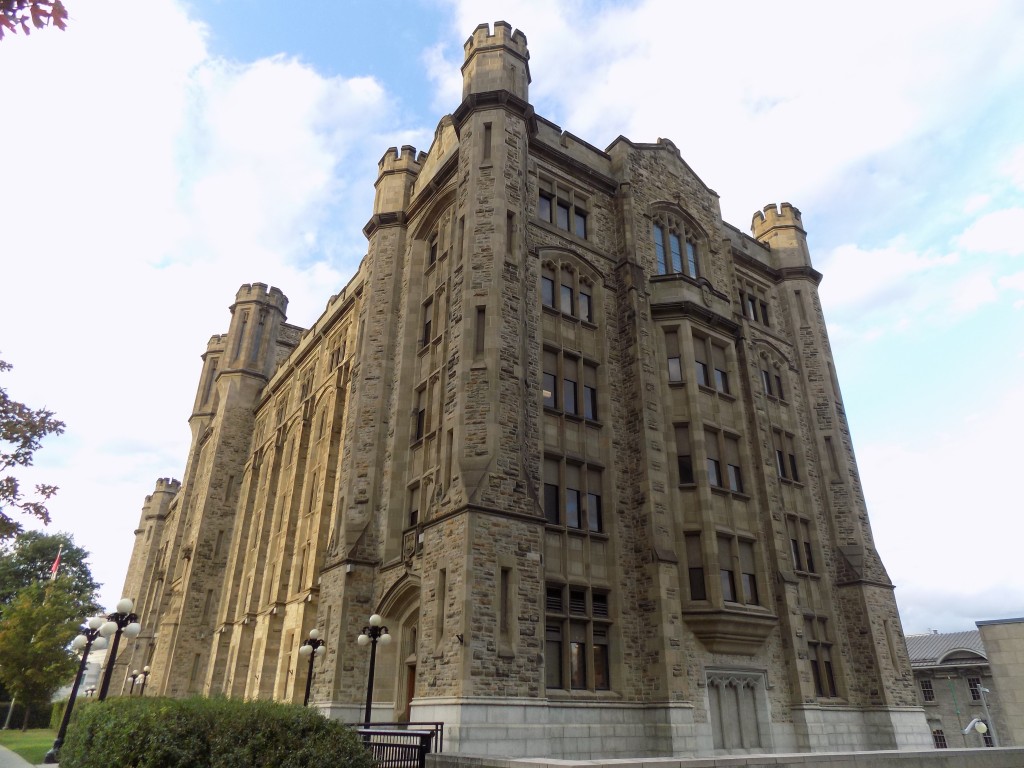Trump and Trudeau offer very different tax plans

Tax turrets; The castle-like Connaught Building on Sussex Drive in Downtown Ottawa is the headquarters for the Canada Revenue Agency. Photo: James Morgan
Winning over the middle class
Justin Trudeau’s government in Canada and the Trump administration in the U.S. are both fighting for the hearts, minds, and especially wallets of the middle class; they’re just going about it very differently when it comes to taxes.
The Trudeau-led Liberal party campaigned on helping the middle class in 2015, and so did conservative Donald Trump in 2016. They have revealed very different tax plans, but it’s a matter of debate whether either plan will benefit the middle class.
The Trudeau plan
Since being elected in 2015, the Trudeau government has cut income taxes by about two percent for individuals earning from just under $46,000 up to almost $92,000 per year, benefiting an estimated nine million people. Taxes were also raised on the wealthiest one percent. However, the government has also eliminated many tax credits where people could claim certain expenses and receive a reduction. Those included credits for things like the yearly cost of using public transportation or registration fees for children’s sports and recreational activities. Whether a middle-class taxpayer would gain or lose overall would depend on how much they relied on the credits.
The Trump plan
The recently announced Trump/Republican plan proposes major cuts to all income levels and the corporate tax rate would drop to 15 percent. While many details of the plan have not been fleshed out, such as where tax levels begin and end, and which deductions would be eliminated, the non-partisan Tax Policy Center has said that the wealthiest Americans stand to benefit the most.
Small business tax changes for Canada
The Trudeau plan includes ending a couple of ways small business owners have been able to reduce their income taxes. “Income sprinkling” – where a business owner can divide their income with their spouse or among immediate family members – is one thing that could end. The other is the ability for small business owners to legally incorporate and claim their personal income as business profits. This approach has also been very popular with professionals such as doctors and lawyers. Finance Minister Bill Morneau insists that the plan is designed to create a fair tax system.
Reactions pro and con
The incorporated professionals and small business owners are not very happy about the plan. Angry people and audiences have shouted down Morneau at public meetings during his “listening tour” on the tax plan. Morneau recently hinted that some changes could be made to the plan, but did not give details. The opposition Conservatives then accused Morneau of staging a “climb down” after hearing so many complaints.
The Canadian Federation of Independent Business (CFIB) represents 109,000 small and medium-sized business owners. Senior Policy Analyst Ashley Ziai said she had never spoken to so many angry business owners as in the past few months.
Ziai said it was unfortunate that there was such a short consultation period for the proposals and that they were announced on July 18 when many people are on summer vacation and not paying attention to politics. She said it is unfair that business owners are being labelled as “tax cheats” because many of the loopholes they have been using were actually created for them to use in the first place and that many professionals had been encouraged to incorporate for tax purposes. Ziai added that the CFIB also thinks it’s unfair that the government is comparing the tax structure for small business owners to regular salaried employees.
The CFIB has joined with 77 other groups representing small business and corporation owners of all varieties and formed the Coalition for Small Business Tax Fairness to oppose the proposed changes. Many of the groups represent doctors, lawyer, farmers, and tradespeople.
The conservative-leaning Canadian Taxpayers Federation (CTF) is strongly opposing the proposed tax changes, too. The CTF would rather see even amounts of tax reduction for all income earners rather than closing existing loopholes directed at small business owners and professionals. “The government cannot credibly claim that such a substantial increase in the tax burden will not decrease the incentives for Canadians to undertake the costs and risks of running small businesses,” said CTF Federal Director Aaron Wudrick in a recent letter to Bill Morneau.
The Canadian Centre for Policy Alternatives (CCPA), a left-leaning organization, is more supportive of the tax proposals. The CCPA believes in a progressive tax system and closing loopholes at the higher end of the income scale. Its senior economist, David MacDonald, said income sprinkling should not be allowed for small business owners to use and called it a “tax dodge.”
MacDonald insisted even with the changes, only 5 percent of Canadian families involved in small business would be affected anyway. He added that communication has been poor and confusing about the plan, leading many business owners to incorrectly think they will no longer be able to hire family members to work for them. MacDonald noted that a form of the income sprinkling option is legal in the U.S., where returns can be filed for families, not just individuals.
MacDonald also said the government is trying to discourage business owners from using profits as a retirement savings strategy and wants them to use official means like the Registered Retirement Savings Plan (RRSP), the Canadian version of the US 401K.
Two plans, two nations, one complaint
The Trudeau tax plan versus the Trump tax plan reflects the politics of two very different governments. But liberals and conservatives, Canadians and Americans alike always have some complaint about taxes. Someone is always paying too much or too little, and someone is always unhappy about how the government spends its revenue.







